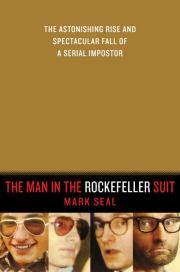 Mark Seal was kind enough to answer some of my questions about his new book, THE MAN IN THE ROCKEFELLER SUIT.
Mark Seal was kind enough to answer some of my questions about his new book, THE MAN IN THE ROCKEFELLER SUIT.Your publisher compares Clark Rockefeller to Patricia Highsmith’s Mr. Ripley, and a person in the book compares him to Swift’s Tom Jones, but he reminded me of another fictional character: F. Scott Fitzgerald’s Jay Gatsby, who changed his name (from James Gatz) as a mere boy:
“I suppose he’d had the name ready for a long time . . . His parents were shiftless and unsuccessful farm people—his imagination had never really accepted them as his parents at all . . . . So he invented just the sort of Jay Gatsby that a seventeen-year-old boy would be likely to invent, and to this conception he was faithful to the end,” in pursuit of “a vast, vulgar, and meretricious beauty.”
I thought of this every time I read accounts of people who felt Rockefeller was an egotist, or that he seemed desperate to appear not just like them, but better than them. Did the parallel ever occur to you in the years that you did this research?
Yes, you are absolutely on target. Gatsby, like Rockefeller, is about a man nobody truly knew, who hid behind façade of wealth and taste that really wasn’t really real. As you note, Gatsby was a boy named Jimmy Gatz from North Dakota without connections, money, or education. He invented himself as Gatsby, much the way Christian Gerhartsreiter did as Clark Rockefeller.
Throughout all of his identities, “Rockefeller” never seemed to do actual work, other than the task of manipulating other people, their homes and their money. So where did he get his impressive art collection—or, if it was fake, how did the art itself fool so many people?
It’s one of the big mysteries of the book, and everyone seems to have a different answer. Some say the art was loaned to him by a friend, others insist that he had the copies done by some unidentified copyist somewhere, someone else insisted that he possibly painted them himself (which I found difficult to believe, considering the quality of the paintings). His attorney told me the paintings were derivatives, worthless, really. But they were indeed done so well they fooled artists, art experts and galley owners.
How do you account for the fact that some very smart people were utterly bamboozled by Rockefeller, while others (including one notable woman who compared the story to “The Emperor’s New Clothes”) said they never for a moment believed in him or his ridiculous persona. What might have accounted for the difference?
Of course, many who say that they knew now may not have been as vocal back then. So it’s difficult to say who really knew and who didn’t. He was extremely believable, at least in the beginning, and people are willing to believe things when they are said by some one who is seemingly educated, erudite and, most importantly, has a famous name.
To a certain extent, Rockefeller’s wife seemed to buy into his fiction because he filled a requirement in terms of her own aspirations. Do you think her ambition was the major reason that she never seemed to question all of the inconsistencies in her husband’s life?
She is a very smart, educated woman. I believe she was taken in for the same reasons as everyone else, and she insisted in the trial that she didn’t use his name for career advancement.

You met Clark Rockefeller. What was your own feeling after your meetings? Did you feel his charisma, or did he seem pathetic?
I was not able to interview him. The book is built on interviews I conducted with those who knew him, police reports, court transcripts, television and other media documents. And, of course, I was able to observe him day after day in the month-long trial.
Ah. If we viewed Rockefeller in terms of the Tragic Greek Hero, what do you think would have been the primary flaw that led to his downfall? After all, he managed to live his false lives for a very long time. Was it Clark Rockefeller who brought down Clark Rockefeller?
The flaw that led to his downfall is that he wanted it all: the $800,000 divorce settlement from his ex-wife and his daughter, even though his ex-wife was granted custody. He brought himself down by kidnapping his daughter.
Does Rockefeller embody a twisted version of The American Dream?
Yes, in the sense that he was like so many immigrants who came to this country: reinventing himself for the new world. However, in Clark’s case, somewhere along the line he forgot about facts and embraced a life of fiction.
Do any of Rockefeller’s friends visit him in prison?
Yes, several of them have said they visited him in prison.
Interesting! Were there people who testified on his behalf in court?
There were psychologists and psychiatrists who testified on his behalf.
Now that Christian Gerhartsreiter has been charged with murder, do you anticipate that he will be in jail for life, or do you think that he might charm a jury into acquitting him?
I wouldn’t want to second-guess a jury. But like everything about this case, I will be riveted to the trial and its outcome.
Mark Seal, thanks so much for letting me read this fascinating book and for answering some of my burning questions.
A journalist for thirty-five years, Mark Seal is a contributing editor at Vanity Fair and the author of THE MAN IN THE ROCKEFELLER SUIT: THE ASTONISHING RISE AND SPECTACULAR FALL OF A SERIAL IMPOSTOR, now on sale. Seal was a 2010 National Magazine Award finalist for his Vanity Fair profile of Clark Rockefeller.
He lives in Aspen, Colorado. View Seal's website at www.markseal.com


